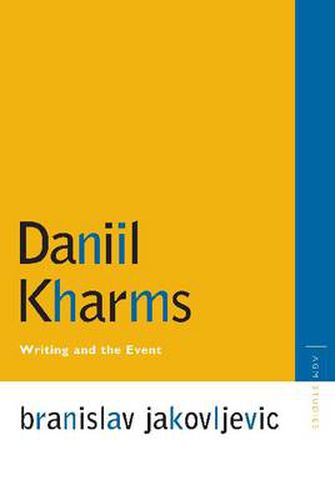Readings Newsletter
Become a Readings Member to make your shopping experience even easier.
Sign in or sign up for free!
You’re not far away from qualifying for FREE standard shipping within Australia
You’ve qualified for FREE standard shipping within Australia
The cart is loading…






The ‘texts’ of Russian artist and thinker Daniil Kharms (1905-1942) were so many and varied and often unique (narrative, dramatic, philosophical, poetic, mathematical, pictographic, diagrammatic, musical, biographical) that they defied categorization - and, thus, thorough study or appreciation - through much of the twentieth century. This book, the first in English to view Kharms’ oeuvre in its entirety, is also the first to offer a complete, inclusive, and coherent understanding of the overall project of this artist and writer now considered a major figure in the modernist canon of Europe. The book follows Kharms’ development as a creative thinker, inquiring into the nature of Kharmsian nonsense, the ontological status of the OBERIU object, writing as performance, Kharms’ gestural language, his ‘language machines’, and his ideas of order, number, infinity, and chance. Reading every paper trace (as well as extant memories) of Kharms’ activities as part of a large project of world creation, Branislav Jakovljevic situates him in a twentieth-century effort - exemplified by Kafka, Beckett, Artaud, Malevich, and Khelbnikov, among others - to go beyond an interpretation of meaning circumscribed by rational and logical thought. Examining texts that could conceivably be called ‘literary’ as well as sketches, diagrams, hieroglyphs, photographs, and unclassifiable others, Jakovljevic’s study is the first to provide a properly broad perspective on this creative thinker’s farranging, far-reaching, and finally comprehensive achievement.
$9.00 standard shipping within Australia
FREE standard shipping within Australia for orders over $100.00
Express & International shipping calculated at checkout
The ‘texts’ of Russian artist and thinker Daniil Kharms (1905-1942) were so many and varied and often unique (narrative, dramatic, philosophical, poetic, mathematical, pictographic, diagrammatic, musical, biographical) that they defied categorization - and, thus, thorough study or appreciation - through much of the twentieth century. This book, the first in English to view Kharms’ oeuvre in its entirety, is also the first to offer a complete, inclusive, and coherent understanding of the overall project of this artist and writer now considered a major figure in the modernist canon of Europe. The book follows Kharms’ development as a creative thinker, inquiring into the nature of Kharmsian nonsense, the ontological status of the OBERIU object, writing as performance, Kharms’ gestural language, his ‘language machines’, and his ideas of order, number, infinity, and chance. Reading every paper trace (as well as extant memories) of Kharms’ activities as part of a large project of world creation, Branislav Jakovljevic situates him in a twentieth-century effort - exemplified by Kafka, Beckett, Artaud, Malevich, and Khelbnikov, among others - to go beyond an interpretation of meaning circumscribed by rational and logical thought. Examining texts that could conceivably be called ‘literary’ as well as sketches, diagrams, hieroglyphs, photographs, and unclassifiable others, Jakovljevic’s study is the first to provide a properly broad perspective on this creative thinker’s farranging, far-reaching, and finally comprehensive achievement.